Ageing in Singapore: Missed Opportunity of the Century?
After a dry spell for a few years, I have suddenly had 3-4 conversations about ageing in Singapore in the past couple of weeks.
It feels like deja vu, in terms of what I am saying, also because nothing much has really changed in the wider system.
Since I generally dislike repeating myself, I thought that I should put down my observations & thoughts about ageing in Singapore in writing, so that I don’t have to repeat myself: I can just refer people to this. 🙂
If I have to summarize my thoughts around ageing in Singapore in a single-sentence TLDR, it would probably be this:
TLDR – If we don’t change our mindset & direction, ageing is going to be Singapore’s biggest missed opportunity of the century.
Ageing is a multi-decade mega trend which affects Singapore but also the wider Asia Pacific region: some of the fastest ageing countries are in our part of the world, including China, Japan, South Korea.
But interestingly, even in youthful countries like Indonesia and India, the sheer numbers of elderly (65+ years old) will only increase: based on UNDESA projections, Indonesia’s population of 65+ year olds from 20 million in 2025 to 50 million by 2050; India’s elderly population is projected to grow from approximately 100 million to more than 250 million in the same time scale. (Stats taken from https://population.un.org/wpp/Graphs/DemographicProfiles/Line/356, under the “Population by broad age groups” charts).
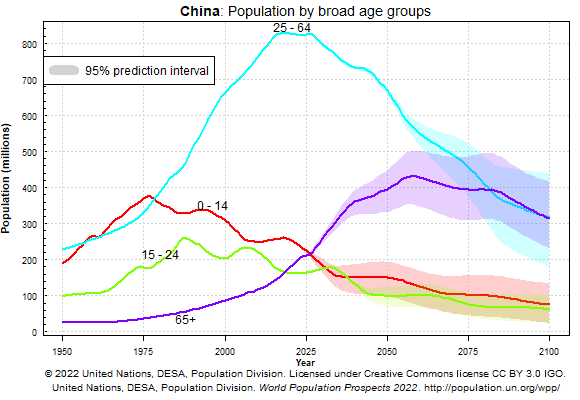
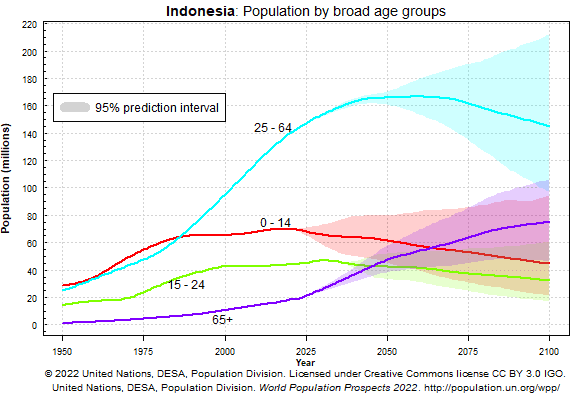
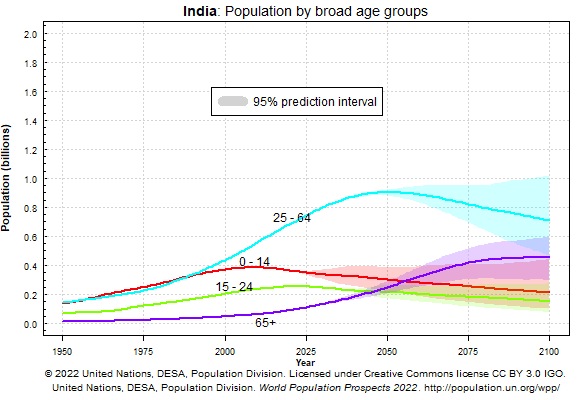
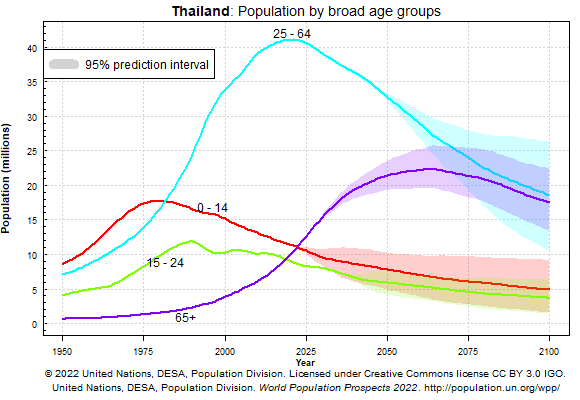
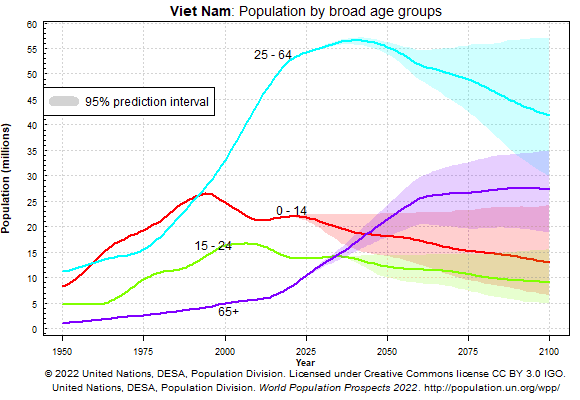 So even as Singapore grapples with the needs of its ageing population, it is situated in a region that is awash with similar needs: it is quite sobering to realise that Indonesia will have almost 20x our elderly population by 2050!
So even as Singapore grapples with the needs of its ageing population, it is situated in a region that is awash with similar needs: it is quite sobering to realise that Indonesia will have almost 20x our elderly population by 2050!
It is quite rare for Singapore to be faced with challenges that are also faced by other countries around it. This presents an opportunity for Singapore to potentially solve its own challenges & needs in ageing, while simultaneously exporting its products & solutions to the wider region. Instead of worrying about the fiscal challenges caused by an ageing society, and robbing Peter to pay Paul within Singapore, we thus have an opportunity to potentially fund our ageing-care needs by exporting our solutions.
But in order to do so, we in Singapore need to be organised correctly & have the right mindsets to harness this opportunity. I am not sure we do.
Is ageing == healthcare?
The first mindset shift we need is to realise that ageing is not just a healthcare issue.
Currently, the paradigm is of ageing as primarily a healthcare issue. This can be seen from the government structures: the main secretariat supporting the Ministerial Committee of Ageing is the Ministry of Health’s Ageing Planning Office.
In the current paradigm, ageing is naturally the primary responsibility of the Ministry of Health. This is well and fine if we are content to keep to the current scope: MOH is the primary regulator for healthcare, so if ageing is mainly a healthcare issue, then this structure makes sense.
But if we intend to eventually develop an exportable industry which then, then the current mindset & structure makes no sense. A domestic regulatory agency’s main job is to regulate, not to develop an industry. Hence, with MOH as the primary agency, the focus will be on healthcare regulation, not on industry development of a nascent industry. This will then make it hard to develop and execute a long-term strategic plan to fine-tune our solutions for export, because our solutions will be focused on meeting our domestic conditions set by our domestic regulator.
But perhaps the biggest challenge is that, a healthcare focus also misses out on the consumption opportunity around ageing. My parents are 75 and 71 this year, and like many of their friends, are well-to-do enough as retirees to be able to freely travel. How would MOH be able to lead and comment on creating the right industry development policies targeting upper-middle class silver travellers? Or for MOH to lead and comment on policies to support the design of products & services (which would be more under Design Singapore)?
Ageing as a healthcare focus also misses out on the other important dimensions of an ageing population, such as retirement adequacy, community (e.g. intergenerational relations), private sector manpower, lifelong learning, defence, even the extreme heat due to global warming (which affects the elderly disproportionately more than the young).
I am not that familiar with the whole of government, so I would defer to others to suggest a better structure. My sense is that it might be better if the primary agency for ageing is either the Prime Minister’s Office Strategy Group (and leave MOH APO to focus on healthcare), or that there should be a co-lead agency with MOH APO around ageing’s economic opportunity.
Is ageing just a domestic issue?
The other mindset shift is to recognise that ageing isn’t just a Singapore matter, but an Asian one. In order for us to develop exportable solutions, we need to also have a foot in the door in the target markets: you cannot create solutions without accounting for the use context.
Is ageing just a government responsibility or solely a free-market matter?
The third mindset shift is to recognise that ageing requires a private public partnership model. This is because, if we are talking about ageing as an economic opportunity, that necessitates the involvement and development of the private sector. At the same time, since this is a very nascent space, it makes no sense to leave this solely to market forces.
The Singapore government cannot (and should not) do all this alone, but it needs to take on the role of Head Gardener for the sector:
- it needs a point of view of the garden (i.e. a vision of what the ideal end state looks like), even down to developing specific tech roadmaps (where applicable)
- then it needs to create the supporting conditions for companies to be able to flourish (e.g. figure out what are the areas which are worth exporting, what capabilities Singapore needs to develop as a competitive advantage, what types of companies we need),
- and to figure out how best to support these companies’ development, including watering and adding fertiliser (i.e. figuring out an incentives structure & developing a point of view of which companies to develop & support)
- If need be, the Singapore government should not be afraid to call for proposals to address its specific needs, and to award spiral contracts for the development of proprietary technology: government contracts have been a powerful tool for tech and industry development, ever since Silicon Valley’s earliest days.
What I describe above is basically industry development, which is an in-between, and which probably gives us the best chance to harness the opportunity of the century.